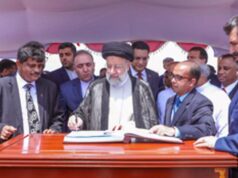Can UK Prime Minister Boris Johnson say no to a referendum on Scotland’s independence? Boris Johnson and Nicola Sturgeon don’t agree on the need for an independence referendum.
Boris Johnson and Nicola Sturgeon don’t agree on the need for an independence referendum.
Ever since the United Kingdom voted to leave the European Union in 2016, there have been growing calls within Scotland for independence.
And since UK Prime Minister Boris Johnson — now a staunch Brexiteer — won last week’s election by a mile, those calls have ramped up.
Now, Scotland’s First Minister Nicola Sturgeon is demanding an independence referendum.
Why does Scotland want independence?
Here’s the conundrum:
In 2014, Scotland held an independence referendum and 55 per cent of Scots voted to remain in the UK.

BBC’s results page shows the unanimous decision Scotland made to Remain in the EU in 2016.
But in the 2016 Brexit referendum, 62 per cent of Scots voted to stay in the EU.
Mr Johnson’s Conservative Party won a landslide victory in last week’s general election. But, north of the border, Ms Sturgeon’s Scottish National Party (SNP) won 48 of the 59 seats which were up for grabs.
Now, with Mr Johnson promising to “get Brexit done” by January 31, the urge for an independence referendum has been kicked into overdrive.
While Ms Sturgeon has acknowledged that not everyone who voted for her party explicitly wanted independence, she said Scotland had voted to “have a choice” over its future.
“Boris Johnson may have a mandate to take England out of the European Union, he emphatically does not have a mandate to take Scotland out of the European Union,” she said.
Space to play or pause, M to mute, left and right arrows to seek, up and down arrows for volume.
Can Boris say no to a referendum?
He already has.
He told Ms Sturgeon on Friday he would not agree to another independence vote, saying the 2014 referendum result indicated Scotland “did not want to return to division and uncertainty”.
But Ms Sturgeon is adamant that Scotland won’t “be imprisoned in the union against its will”.

Boris Johnson on the final day of campaigning before the election.
But is it up to him?
Pretty much.
Under UK law, the Scottish Parliament cannot pass legislation that relates to “reserved matters” (ie. matters reserved for Westminster). One of those reserved matters is the union of the Scottish and English kingdoms.
In 2012 the two governments signed the Edinburgh Agreement — also known as a Section 30 order — which allowed Scotland to hold the 2014 independence referendum.
The Edinburgh Agreement was only temporary, so if Scotland wants to trigger another referendum it will need a new agreement with Mr Johnson. And that’s not likely to happen.
Nevertheless, Ms Sturgeon has pledged to ask the UK Government for a Section 30 order.
Why doesn’t Scotland just call a referendum itself?
Ms Sturgeon has indicated she wants to do things by the book and has been working towards legalising a process that would pave the way for a vote.
She introduced the Referendums (Scotland) Bill — AKA indyref2 — to parliament in May, outlining provisions for a vote.
That bill has since gone through two waves of amendments and debates, with stage three up for debate on December 19.
Ms Sturgeon is hoping to have the bill passed before Christmas so she can hold a referendum in the second half of 2020.
But Scottish government ministers have said further legislation is needed before another referendum can be held.
In any case, any possible referendum would be held after the UK leaves the EU, which means Scotland would have to apply to get back in.
Who can vote in a Scottish referendum?
In the 2014 referendum, you could vote if you were a citizen of:
- The UK
- Commonwealth nations
- European Union
The provisos were that you had to be over the age of 16, and you had to be registered to vote in Scotland. Scots living outside Scotland were not allowed a say.
When was the last time Scotland was independent?
In modern history, Scotland first shared a crown with England in 1603.
That’s when Queen Elizabeth I died childless and James VI of Scotland was the next in line to the throne.
As King James I, he moved his court south and reigned over both countries.
Following the Wars of the Three Kingdoms that saw England, Scotland and Ireland battling over religious differences, Scotland formally united with England through the Act of Union in 1707 — forming Great Britain.



